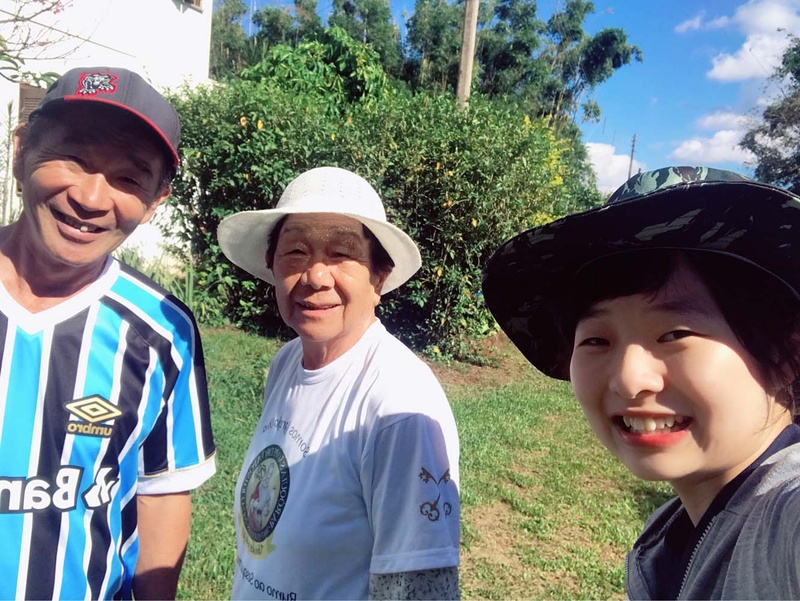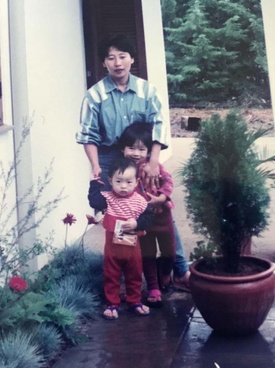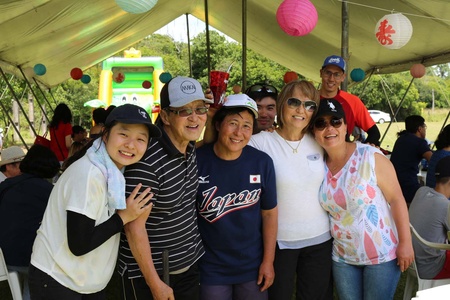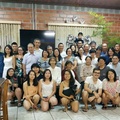I decided to come to Brazil when I was in my fourth year of university and looking for a job. Before that, I had been aiming to become a teacher.
However, when I went on my teaching practice in May of my fourth year, I experienced firsthand how difficult and challenging the job of a teacher is, and I felt that it was not suited to me at that time, so I gave up on that path.
Then I began to panic and look for a job. Wherever I went I wore a black suit, bag, and shoes, all the women in the company had their hair in a ponytail, and I gave the same template of what to say in interviews. I think that at that time I was the least like myself I had ever been.
When I was in school, my parents never once told me to study, do my homework, get good report cards, or be good in school.
However, whenever I did something good at school and my teacher praised me, whenever I got good grades in my studies, whenever I was accepted into a university, they always recognized and accepted me. So, I always chose the high school and university that I wanted to go to and lived the way I wanted to live.
And when I was job hunting, my parents were always watching me and knew I was suffering.
"The current Ayori is not like Ayori at all. If you are really struggling because you don't know what you want to do, you could go to Brazil and learn Portuguese.
In Japan, as soon as everyone graduates from university, they all start working together like they're in a race.
But who said I have to do the same as everyone else? My life is my own.
There is no need to choose the same path as everyone else. It's your life, so you should live it the way you want to. You have relatives in Brazil. You have the opportunity to choose a different path than other people. You can decide for yourself what you want to do."
So when my mother suggested that I go to Brazil, I decided to go there and learn Portuguese.
Born in Malinga, raised in Japan, to a homeland I don't know
That was the start of my one-year life in Brazil. I was born in Maringa, Parana, and moved from Brazil to Japan when I was one and a half years old. The only Brazil I knew was the one in textbooks and books.
I arrived in Brazil with a lot of questions: Does my grandmother live in a place surrounded by mountains with huge fields like coffee plants? Are there baths? Are there supermarkets or convenience stores?
On the way from the airport to the town of Iboti, the cityscapes I saw from the car window, such as Novo Hamburgo and São Leopoldo, were completely different from what I had imagined Brazil to be. There were big buildings, outlets, and even shopping centers, and I felt glad to be out in the world.
If I had stayed in Japan, my image of Brazil might have remained as just another underdeveloped country in South America.
And when I arrived in Colonia, where my grandmother lives, I was surprised again. "What a rural place! That was my first impression of Colonia. My grandmother's house has a bath, but it's a type of bath that they light themselves, using matches and burning wood, and I thought how primitive it was.
Also, there are a lot of insects, and for the first time in my life I realized I was allergic to black flies after being bitten by one.
As I participated in events held by the colony and Japanese people, I got to know many people and made many friends.I learned about the lives they led after immigrating and as I interacted with their descendants, I began to think more about what it means to be Japanese.
I myself studied the history of immigration between Japan and Brazil at university, so it was a very valuable experience for me to come to Brazil and actually talk to first-generation and second-generation immigrants.
I studied immigration at university to understand myself
Why did I want to study immigration even to the point of going to university? It was to find answers to questions such as what kind of person I am, how I was born, and how I will live my life from now on.
Having lived in Japan for as long as I could remember, all I knew was that my parents were Brazilian and that I was Brazilian too. They spoke Portuguese to each other, but when they spoke to me and my sister, they used a mix of Japanese and Portuguese.
However, when we started school, we hardly used Portuguese and tried to use Japanese instead. The higher I went, the more I felt that I was different from the other children.
The reason for this is that I have to explain things to my parents when they send letters from school, and when they send work-related documents, I have to explain things to them or write them down if the kanji or words are difficult.
I still remember the many times I had arguments with my mother about paperwork. Whenever I made a face, she would always say, "Your parents are foreigners," and I wondered if things would have been different if I had been born into a Japanese family.
*This article is reprinted from the Nikkei Shimbun (March 15, 2019).
© 2019 Geovana Ayori Hayashi






